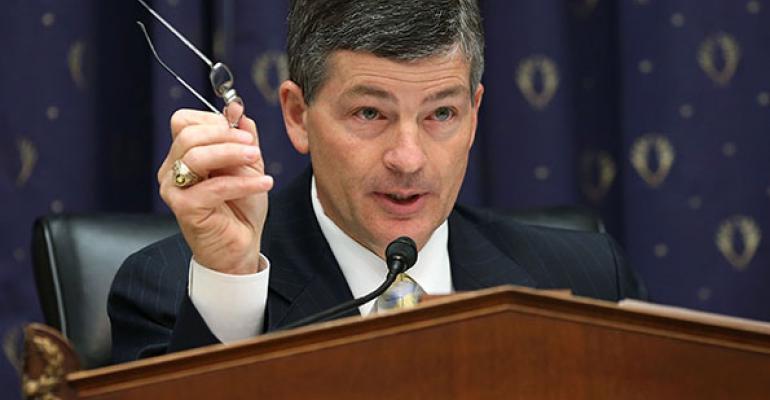By Elizabeth Dexheimer
(Bloomberg) --Jeb Hensarling, who leads the U.S. House panel that writes laws for the financial industry, said he won’t seek reelection next year, becoming the latest high-profile Republican to announce plans to retire from Congress.
“Although service in Congress remains the greatest privilege of my life, I never intended to make it a lifetime commitment, and I have already stayed far longer than I had originally planned," Hensarling, 60, said Tuesday in a statement
As chairman of the House Financial Services Committee, the Texas lawmaker leads a powerful panel that oversees regulators including the Federal Reserve and the Securities and Exchange Commission. The committee also works on key legislation affecting Wall Street, prompting some lobbyists to refer to it as the ATM because being a member all but guarantees a steady stream of campaign contributions from big banks and other financial services companies.
Hensarling voted against the $700 billion bank rescue, known at TARP, in the wake of the 2008 financial crisis. While he’s been a vocal critic of all the rules imposed on the industry since then, his relationship with Wall Street has been frosty at times, as he often embraces populist rhetoric and boasts he’s not a friend to megabanks.
Hensarling’s decision follows on the heels of retirement announcements by Republican Senators Jeff Flake and Bob Corker. While Flake and Corker couched their departures with statements decrying the state of the Republican Party under President Donald Trump, Hensarling has been an avid supporter of Trump’s agenda to rip up regulations that Republicans blame for stifling economic growth.
Expiring Term
Hensarling’s term as chairman expires next year, so his role overseeing financial firms was already expected to dim. The competition for the next financial services committee chairman is expected to ramp up in the coming months, though much remains uncertain before next year’s congressional elections as Democrats make a serious bid to gain a majority in the House.
Should Republicans keep control of the chamber, some senior members of the committee who could be contenders for the job include Patrick McHenry of North Carolina, Ed Royce of California and Frank Lucas of Oklahoma. Other members on the committee who may seek the job include Bill Huizenga, from Michigan, and Blaine Luetkemeyer, from Missouri.
Hensarling is the 19th House Republican to announce plans to retire or leave to seek higher office. It isn’t unusual for lawmakers to retire when their chairmanship ends; Republicans have term limits for congressional chairmanship positions, while Democrats do not. Hensarling’s district, which covers the eastern edge of Dallas across an expansive area to the southeast, is safely Republican. He won his eighth term in 2016 with 81 percent of the vote.
Hensarling said in the statement that there is still work to be done in the 14 months he has left on Capitol Hill. One of his signature pieces of legislation as chairman of the financial panel was the Financial Choice Act, a bill that ripped up major portions of the Dodd-Frank Act. The legislation passed the U.S. House earlier this year but it’s prospects of advancing in the Senate are slim. Housing reform is another priority for the committee in the coming months, Hensarling said.
He was first elected to Congress in 2002 and succeeded Spencer Bachus, a Republican from Alabama, as chairman of the financial services panel, starting in 2013.
To contact the reporter on this story: Elizabeth Dexheimer in Washington at [email protected] To contact the editors responsible for this story: Jesse Westbrook at [email protected] Joe Sobczyk





